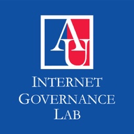Every year, think-tanks, civil society organizations, governments, technology companies, and academia churn out reports and proposals on critical internet governance issues. As prominent Internet Governance scholar, Wolfgang Kleinwächter asks, “What will we do with this knowledge?” How do we maximize our learning from these “fractal,” global, and multi-stakeholder discussions of internet governance? These were the question at the center of the discussion led by IGL Faculty Director, Dr. Nanette Levinson, on Friday, February 12 as part of the IGL 2019 Speaker Series.
While other research areas like environmental governance and healthcare have treated learning as a critical component of policy-making and research, the internet governance arena has not yet given it the attention it is due. Dr Levinson sees key pieces of the puzzle missing in current work on knowledge-creation in internet governance; she argues that there is not yet a cross cultural view of networked learning, a treatment of power in governance learning, or a longitudinal view that emphasizes long-term learning outcomes.
In her current project, she highlights how these critical components can be leveraged to maximize learning outcomes, some of the challenges or hindering factors, and facilitating factors that are conducive to better learning. Given the fractured and disparate bodies of governance in this arena, she draws on work by scholars Christopher Ansell and Jacob Torfing to emphasize the importance of a unifying storyline that will pull together a diverse coalition.
Dr. Levinson argues for a shift in focus from capacity building to absorptive capacity of nation-states and organizations in areas like technical and legal skills, administration and and policy-making, and cross-cultural collaboration. She calls attention to the critical role of leadership in facilitating learning: here, she cites the foundational role of people like Nitin Desai who shaped early internet governance scholarship and policy work. Finally, she stresses the importance of studying organizations like the Internet Governance Forum, which while discursive, are still a crucial component in the current internet governance ecosystem that provide a platform for knowledge-creation on critical governance issues.

